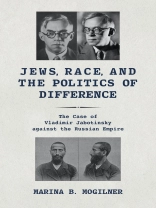Jews, Race, and the Politics of Difference explores how Russian Jewish writers and political activists such as Vladimir Jabotinsky turned to ‘race’ as an operational concept in the late imperial politics of the Russian Empire.
Building on the latest scholarship on racial thinking and Jewish identities, Marina Mogilner shows how Jewish anthropologists, ethnographers, writers, lawyers, and political activists in late imperial Russia sought to construct a Jewish identity based on racial categorization in addition to religious affiliation. By grounding nationality not in culture and territory but in blood and biology, race offered Jewish nationalists in Russia a scientifically sound and politically effective way to reaffirm their common identity.
Jews, Race, and the Politics of Difference presents the works of Jabotinsky as a lens to understanding Jewish ‘self-racializing, ‘ and brings Jews and race together in a framework that is more multifaceted and controversial than that implied by the usual narratives of racial antisemitism.
Mục lục
Acknowledgments
Notes on Transliterations, Translations, and Names
Introduction: When Race Is a Language and Empire Is a Context
1. Race, Zionism, and the Quest for Jewish Authenticity
2. Mediterranean as New European: Race and Europeanness in Zionism and Other New Nationalisms
3. Racial Purity versus Imperial Hybridity: Vladimir Jabotinsky against the Russian Empire
4. Jewish Race versus Russian Race
5. Nationalizing Politics in the Empire
Conclusion
Notes
Bibliography
Index
Giới thiệu về tác giả
Marina Mogilner holds the Edward and Marianna Thaden Chair in Russian and East European Intellectual History at the University of Illinois Chicago. She is cofounder and coeditor of the international journal Ab Imperio and author of Homo Imperii: A History of Physical Anthropology in Russia and A Race for the Future: Scientific Visions of Modern Russian Jewishness.












